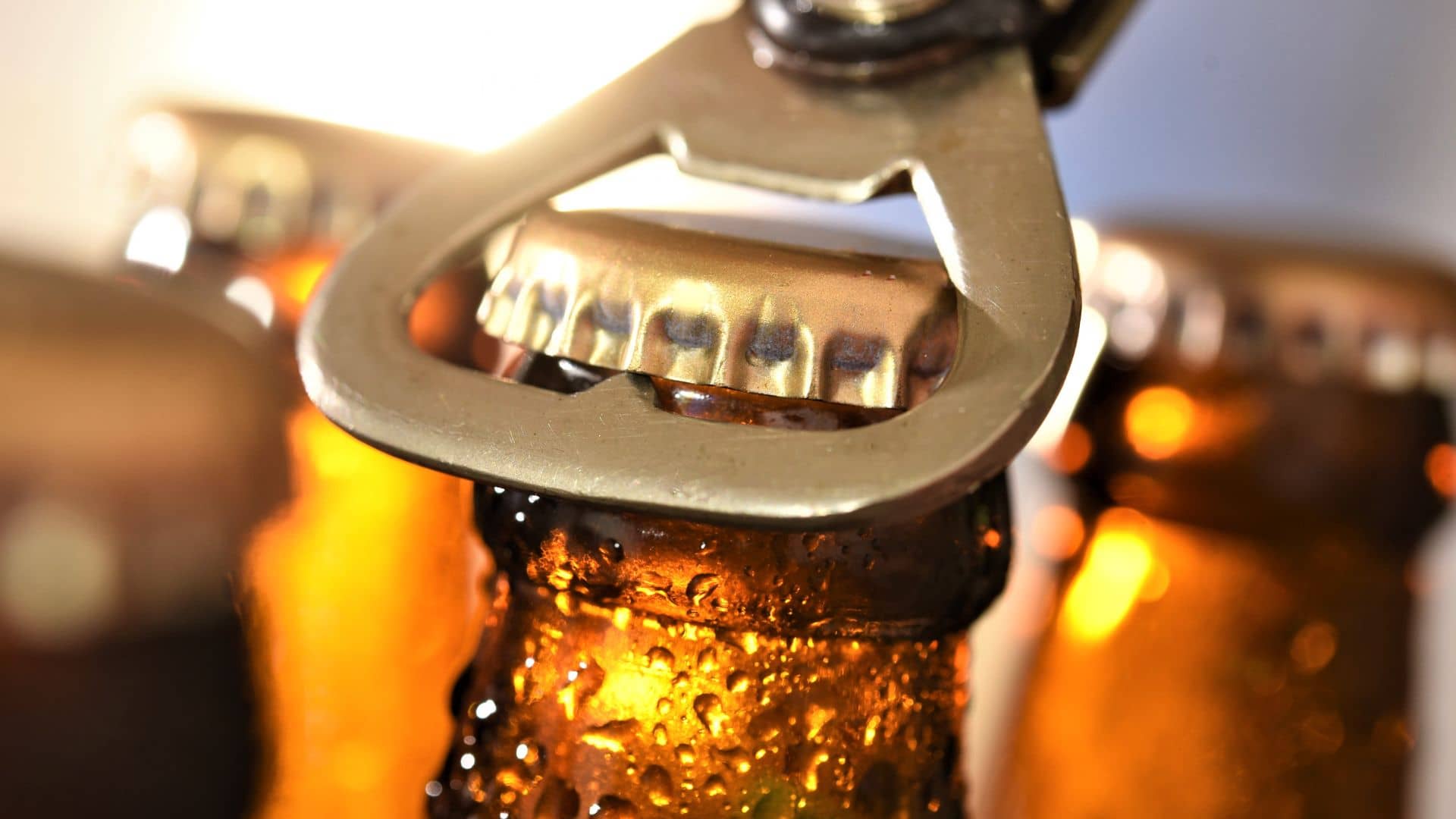Hey there, fitness enthusiasts! We’ve all heard the occasional debate about having a beer before hitting the squat rack.
But is it a good idea, or is it a recipe for disaster? In this blog post, we’ll dive into the science and facts to help you make an informed decision about whether cracking open a cold one before squats is a fitness faux pas or a harmless indulgence. Let’s get ready to squat and sip responsibly!
Understanding whether drinking a bottle of beer “before doing squats” bad idea or not.
Avoid alcohol consumption before your workout is recommended, Focus on staying hydrated with water, eating a balanced meal with carbohydrates and protein for energy, and maintaining good form and technique.
Drinking beer before performing squats is generally not recommended, and…
here are several reasons for this:
Dehydration: Alcohol is a diuretic, which means it can lead to increased urination and dehydration.
Dehydration can negatively affect your workout performance and increase the risk of muscle cramps and injuries during squats.
Impaired Coordination: Alcohol can impair your motor skills and coordination.
Squats require proper balance and coordination to perform safely and effectively.
Consuming alcohol before squats can increase the risk of accidents and injuries.
Reduced Strength and Endurance: Alcohol can reduce your muscle strength and endurance. It can also decrease your ability to focus and concentrate during your workout.
Squats require a high level of concentration to maintain proper form and technique.
Digestive Discomfort: Beer contains carbonation and can lead to bloating and digestive discomfort. This discomfort can make it challenging to perform squats comfortably.
Increased Risk of Injury: Squats are a compound exercise that places a significant load on the lower back, knees, and other joints.
Alcohol can impair your judgment and make you more likely to push yourself too hard or use improper form, increasing the risk of injury.
Recovery Impairment: After a workout, your body needs proper nutrition and hydration to recover effectively.
Alcohol can interfere with this process and slow down your body’s ability to repair and build muscle tissue.
If you plan to engage in physical activity like squats, it’s advisable to avoid alcohol consumption before your workout.
Instead, focus on staying hydrated with water, eating a balanced meal with carbohydrates and protein for energy, and maintaining good form and technique to reduce the risk of injury.
If you enjoy beer, it’s best to save it for after your workout as a reward or to relax, but always drink responsibly.

Further Explanations
Let’s dive deeper and explain further the point mentioned here.
let’s dive deeper into the first two points: Dehydration and Impaired Coordination.
Dehydration.
Alcohol is a diuretic, which means it encourages your kidneys to produce more urine.
When you consume alcohol, your body eliminates more fluid than it takes in, leading to a net loss of fluids. Dehydration occurs when your body loses more fluids than it can replace.
This is particularly important during exercise, including squats, because you’re already losing fluids through sweating.
Impact on Workout:
Dehydration can have several negative effects on your workout performance. It can lead to a decrease in blood volume, which in turn reduces the delivery of oxygen and nutrients to your muscles.
This can result in muscle fatigue, cramps, and a reduced ability to generate force during squats.
Dehydration can also impair your body’s ability to regulate temperature, potentially leading to overheating or heat-related illnesses.
Impaired Coordination.
Alcohol is known for its effects on the central nervous system. When you consume alcohol, it can impair the functioning of your brain, including your motor skills and coordination.
Impact on Squats:
Squats require precise coordination of multiple muscle groups to perform safely and effectively.
You need to maintain balance, control the descent and ascent of the weight, and keep proper form to avoid injury.
Alcohol’s impact on coordination can lead to shaky movements, reduced stability, and a greater risk of losing balance or using incorrect form while squatting.
This increases the likelihood of accidents and injuries, such as falling or straining muscles.
In essence, consuming alcohol before performing squats can exacerbate the risk of dehydration due to its diuretic properties and hinder coordination and motor skills, which are essential for performing squats safely.
To optimize your workout and minimize the risk of injury, it’s advisable to avoid alcohol before engaging in physical activities that demand precision, balance, and hydration like squats.
Reduced Strength and Endurance.
Alcohol has several effects on your body that can reduce your muscle strength and endurance.
Muscle Function:
Alcohol can interfere with the functioning of your muscles. It impairs the central nervous system, which controls muscle contractions.
This can lead to reduced muscle coordination and strength.
Energy Production:
Alcohol is processed by your liver, and this process can divert resources away from other metabolic functions, including the production of energy for your muscles.
As a result, you may experience decreased endurance and stamina during your workout.
Focus and Concentration:
Alcohol also affects your cognitive function. It can decrease your ability to focus, concentrate, and make quick decisions.
In the context of squats, maintaining proper form and technique is crucial for safety and effectiveness.
Reduced focus and concentration can lead to mistakes in your squatting technique, increasing the risk of injury.
Digestive Discomfort.
Beer, which is a type of alcoholic beverage, contains carbonation due to the presence of dissolved carbon dioxide gas.
This carbonation can lead to digestive discomfort, especially when performing exercises like squats.
Bloating:
Carbonation can cause your stomach to feel bloated and gassy.
This sensation of fullness and discomfort can be distracting and make it challenging to concentrate on your squatting form and technique.
Discomfort:
The bloating and gas associated with carbonated beverages can lead to a feeling of pressure and discomfort in your abdomen.
This discomfort can be particularly problematic during squats, as it can affect your ability to maintain stability and balance while lifting weights.
In all this is that, consuming alcohol before performing squats can lead to reduced muscle strength and endurance, impair your ability to focus and concentrate, and potentially cause digestive discomfort due to the carbonation in beer.
All of these factors can negatively impact your squat performance and increase the risk of injury.
To maximize the effectiveness and safety of your squats, it’s advisable to avoid alcohol consumption before your workout and opt for a well-balanced and non-carbonated beverage to stay hydrated and comfortable.
Increased Risk of Injury:
Squats are a compound exercise that places a substantial load on various muscle groups and joints, including the lower back, knees, and hips.
Alcohol consumption can significantly increase the risk of injury during squats for the following reasons:
Impaired Judgment:
Alcohol impairs your judgment and decision-making abilities. When under the influence of alcohol, you may be more likely to overestimate your capabilities and push yourself too hard while squatting.
This can lead to poor form and technique, increasing the risk of strains, sprains, or other injuries.
Loss of Inhibition:
Alcohol can reduce inhibitions, making you less cautious about your actions. In the context of squats, this might lead to attempts at lifting heavier weights than you can handle safely, which can result in injuries, especially if your form breaks down under the increased load.
Recovery Impairment.
After a workout, your body goes through a recovery process that involves repairing and building muscle tissue, replenishing energy stores, and rehydrating.
Alcohol can interfere with this essential recovery process in several ways:
Nutrient Diversion:
Alcohol is processed by your liver, and this process diverts resources away from other vital functions, including the absorption and utilization of essential nutrients like vitamins and minerals. This can hinder your body’s ability to recover efficiently.
Dehydration:
As mentioned earlier, alcohol is a diuretic, which can lead to increased urination and dehydration.
Post-workout, your body needs adequate hydration to support muscle recovery, and alcohol can disrupt this balance.
Disrupted Sleep:
Alcohol can disrupt your sleep patterns. Quality sleep is crucial for muscle recovery and overall well-being. Poor sleep can lead to decreased muscle repair and delayed recovery.
In summary, consuming alcohol before or after performing squats can increase the risk of injury by impairing judgment and inhibitions, leading to improper form and excessive weightlifting.
It can also hinder the post-workout recovery process by diverting nutrients, causing dehydration, and disrupting sleep.
To optimize your squat performance and recovery, it’s advisable to avoid alcohol consumption around your workout sessions and focus on maintaining a healthy, well-balanced lifestyle.
A tabular on this topic
Here’s a tabular summary of why drinking beer before performing squats is generally considered a bad idea:
| Aspect | Why It’s Bad |
|---|---|
| Dehydration | Alcohol is a diuretic, leading to increased urination and dehydration, which can negatively impact workout performance. |
| Impaired Coordination | Alcohol impairs motor skills and coordination, essential for safe and effective squat performance. |
| Reduced Strength and Endurance | Alcohol reduces muscle strength, endurance, and the ability to focus and concentrate during a workout. |
| Digestive Discomfort | Beer’s carbonation can cause bloating and digestive discomfort, making it challenging to perform squats comfortably. |
| Increased Risk of Injury | Alcohol impairs judgment, increasing the likelihood of pushing too hard or using improper form, leading to injuries. |
| Recovery Impairment | Alcohol interferes with post-workout recovery by diverting nutrients, causing dehydration, and disrupting sleep. |
In summary, drinking beer before performing squats is discouraged due to its potential negative effects on hydration, coordination, strength, endurance, digestive comfort, injury risk, and post-workout recovery.
It’s advisable to avoid alcohol consumption before engaging in physical activities like squats for optimal safety and performance.
Conclusion.
In conclusion, consuming beer before performing squats is not recommended due to its potential adverse effects on hydration, coordination, strength, endurance, digestive comfort, injury risk, and post-workout recovery.
To maximize safety and performance during squats, it’s best to avoid alcohol intake around your workout sessions.

Hey there, it’s Mike Rrsq, the Editor-in-Chief over at Jsquat.com, and I’m absolutely obsessed with all things squat fitness! I’ve been lucky enough to get some serious recognition for my work in this field. With a solid background in the fitness and wellness industry, I’ve been there right from the get-go, helping shape this website into what it is today.
You see, I’m not just the boss around here; I’m also a passionate contributor. I love sharing my insights through my articles, and trust me, they’re not your run-of-the-mill stuff. Each piece I write is a labor of love, filled with my expertise and real-world experience in the fitness universe. So, if you’re into fitness and looking for some inspiration, you’re in the right place!


